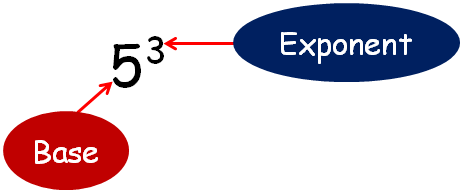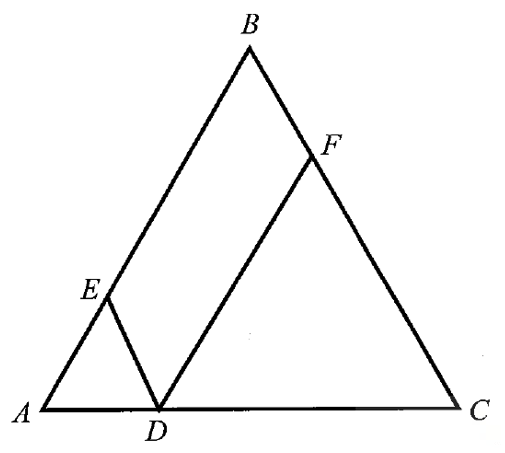UNDERSTANDING EXPONENTS
The picture given below tells us what is exponent and what is base in the given term.

Exponent says that how many times do we have to multiply the base by itself.
For example, let us consider
23 = 2 x 2 x 2
In 23, the exponent is 3. So, we multiply 2 by itself for three times.
Exponent Rules with Examples
Rule 1 :
xm ⋅ xn = xm+n
Example :
34 ⋅ 35 = 34+5
34 ⋅ 35 = 39
Rule 2 :
xm ÷ xn = xm-n
Example :
37 ÷ 35 = 37-5
37 ÷ 35 = 32
Rule 3 :
(xm)n = xmn
Example :
(32)4 = 3(2)(4)
(32)4 = 38
Rule 4 :
(xy)m = xm ⋅ ym
Example :
(3 ⋅ 5)2 = 32 ⋅ 52
(3 ⋅ 5)2 = 9 ⋅ 25
(3 ⋅ 5)2 = 225.
Rule 5 :
(x / y)m = xm / ym
Example :
(3 / 5)2 = 32 / 52
(3 / 5)2 = 9 / 25
Rule 6 :
x-m = 1 / xm
Example :
3-2 = 1 / 32
3-2 = 1 / 9
Rule 7 :
x0 = 1
Example :
30 = 1
Rule 8 :
x1 = x
Example :
31 = 3
Rule 9 :
xm/n = y -----> x = yn/m
Example :
x1/2 = 3
x = 32/1
x = 32
x = 9
Rule 10 :
(x / y)-m = (y / x)m
Example :
(5 / 3)-2 = (3 / 5)2
(5 / 3)-2 = 32 / 52
(5 / 3)-2 = 9 / 25
Rule 11 :
ax = ay -----> x = y
Example :
3m = 35 -----> m = 5
Rule 12 :
xa = ya -----> x = y
Example :
k3 = 53 -----> k = 5
Note
Many students do not know the difference between
(-3)2 and -32
Order of operations (PEMDAS) dictates that parentheses take precedence.
So, we have
(-3)2 = (-3) ⋅ (-3)
(-3)2 = 9
Without parentheses, exponents take precedence :
-32 = -3 ⋅ 3
-32 = -9
The negative is not applied until the exponent operation is carried through. We have to make sure that we understand this. So, we will not make this common mistake.
Sometimes, the result turns out to be the same, as in.
(-2)3 and -23
We have to make sure why they yield the same result.
Solved Problems
Problem 1 :
Find the value of 35.
Solution :
= 35
= 3 x 3 x 3 x 3 x 3
= 243
Problem 2 :
Write the following expression as a power of 5.
(53 + 56) / 57
Solution :
= (53 + 56) / 57
= (53 + 6) / 57
= 59 / 57
= 59 - 7
= 52
Problem 3 :
If a-1/2 = 5, then find the value of a.
Solution :
a-1/2 = 5
a = 5-2/1
a = 5-2
a = 1/52
a = 1/25
Problem 4 :
If n = 12 + 14 + 16 + 18 +...............+ 150, then find the value of n.
Solution :
1 to the power of anything is equal to 1.
So, we have
12 = 1
14 = 1
16 = 1
and so on.
List out all the exponents.
2, 4, 6, 8, ................ 48, 50
Divide each element by 2.
1, 2, 3, 4, ................ 24, 25
We can clearly see there are 25 terms in the series shown below.
12 + 14 + 16 + 18 +...............+ 150
Therefore, n is the sum of twenty-five 1's.
That is,
n = 12 + 14 + 16 + 18 +...............+ 150
n = 25
Problem 5 :
If 42n + 3 = 8n + 5, then find the value of n.
Solution :
42n + 3 = 8n + 5
(22)2n + 3 = (23)n + 5
22(2n + 3) = 23(n + 5)
Equate the exponents.
2(2n + 3) = 3(n + 5)
4n + 6 = 3n + 15
n = 9
Kindly mail your feedback to v4formath@gmail.com
We always appreciate your feedback.
©All rights reserved. onlinemath4all.com
Recent Articles
-
Digital SAT Math Problems and Solutions (Part - 148)
Apr 22, 25 08:20 AM
Digital SAT Math Problems and Solutions (Part - 148) -
Eliminating the Parameter in Parametric Equations
Apr 21, 25 10:37 PM
Eliminating the Parameter in Parametric Equations -
Quadratic Equation Problems with Solutions (Part - 3)
Apr 21, 25 02:37 AM
Quadratic Equation Problems with Solutions (Part - 3)
